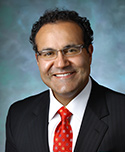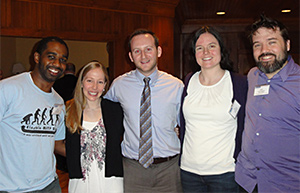

M.D.-Ph.D. Support
Promoting Student Interests for Medical-Scientists in Training
It was standing room only in LeFrak Auditorium when Dr. Alfredo Quiñones-Hinojosa, professor of neurosurgery and oncology at Johns Hopkins University, presented his lecture, "Brain Cancer: Building Bridges As You Walk On Them." He started off by showing a scene from the NBC hospital drama ER, in which a brain surgeon described a pioneering technique for treating neurological tumors. When used in real-life cases, the technique has extended the life of many individuals with brain tumors. Dr. Q, as the renowned surgeon-scientist is known, used this clip to demonstrate the powerful impact that translating basic science research into clinical practice can have on improving patient outcomes.

Alfredo Quiñones, M.D., Ph.D.Dr. Q was selected by students in Einstein's Medical Scientist Training Program (MSTP) to be their guest speaker at the eighth annual Student-Invited Translational Medicine Lecture Series earlier this spring. This academic lecture is one of the pinnacle events sponsored by the MSTP Student Council (MSC) each year.
The MSC represents the MSTP student body at Einstein and serves to provide academic, professional, and social support to the 114 students currently enrolled in Einstein's program – which is one of the nation's oldest, having continuously received funding from the National Institutes of Health since its inception in 1964. The program's goal has been to train a diverse group of outstanding students, who earn both M.D. and Ph.D. degrees, to become future leaders of academic medicine and medical research.
"The Einstein Translational Medicine event provides us with the opportunity to interact with physician-scientists who have successfully combined science and medicine in their careers," explained Jaime Schneider, a fifth-year MSTP student and president of the MSC. "As M.D.-Ph.D.s in training, we are always looking for role models who have effectively been able to translate basic research findings into clinically relevant therapeutic advances. Pursuing either scientific research or clinical medicine is hard enough, so the more exposure we can have to people who are successful in both realms, the better."
Over the past few years, Einstein's MSTP student body has hosted a diverse array of clinician-scientists from all over the country. Past speakers include Dr. Denise Faustman from Harvard, Dr. Carlos Cordon-Cardo from Columbia, Dr. Miguel Nicolelis from Duke, Dr. Robert Gatenby from the H. Lee Moffitt Cancer Center at the University of Southern Florida, and Dr. David Spiegel from Yale. A bagel and coffee hour prior to Dr. Quiñones' lecture, which is part of each of these annual visits, provided MSTP students the chance to interact one-on-one with Dr. Q and have a frank conversation about choosing the physician-scientist career path. "The hope is that the invited speaker will provide us with some personal insights into how to launch a successful career in academic medicine," said Ms. Schneider.

MSC Presidents: (from left) Current MSC president Dayle Hodge with recent past-presidents, Jaime Schneider, David Gross, Joy Hazleton and Keith HazletonIn addition to the annual lecture series, the MSC organizes several events throughout the year that contribute to the educational and personal enrichment of the medical-scientist training process. These events include hosting panels to impart advice about the USMLE Step 1 board examination, the qualifying examination in graduate school, and the residency match process.
"Through events organized by the MSC, upperclassman offer invaluable advice to those of us who follow them," noted Roman Deniskin, a fifth-year MSTP. "They share information about writing a thesis, preparing for oral presentations and studying for the qualifying and medical board exams. These tips are crucial in helping us to identify proper study resources and in reminding us that others have accomplished these important MSTP milestones successfully."
The MSC also hosts bi-monthly coffee hours that serve as a relaxed forum for catching up with fellow MSTP colleagues, a Faculty Appreciation Winter Mixer to express gratitude to those faculty who have invested their time in educating and supporting MSTP students and a Back-to-the-Wards party to celebrate the return to clinical training for those students who have successfully defended their thesis dissertations.
A newly proposed event sponsored by the MSC will invite MSTP alumni to return to Einstein to share information about their current positions and about the steps they took that led them to a career in academic medicine. Additionally, preparations are currently underway to welcome the newest crop of MSTP students to Einstein, beginning with the Summer Welcome BBQ in July and a post-histology celebration to mark the completion of their first course at the College of Medicine.
"Because M.D.-Ph.D. students straddle the diverse worlds of medicine and basic science, the MSC aims to ease these difficult transitions by offering these various opportunities for academic and social support," concluded Ms. Schneider.
Posted on: Tuesday, June 4, 2013


